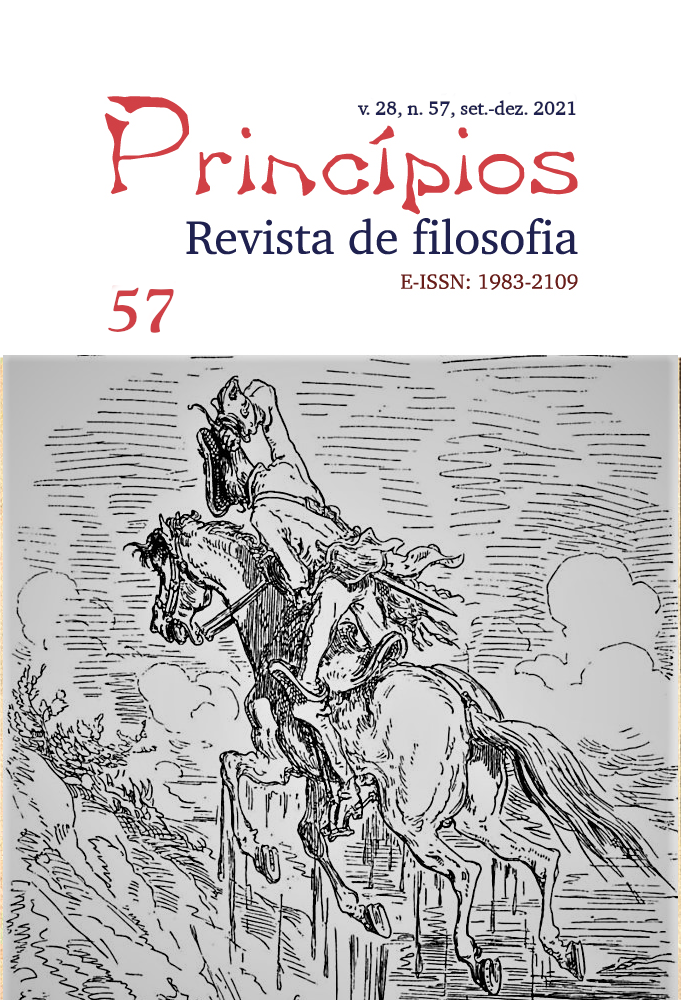Justice Beyond the State: Social Practices and Relational Equality
DOI:
https://doi.org/10.21680/1983-2109.2021v28n57ID25552Palavras-chave:
Transnational justice, Relational equality, Social practices, Basic structureResumo
In this paper, I argue that principles of justice, contrary to what John Rawls and Thomas Nagel believe, do apply transnationally. I start with a debate about the proper scope of justice and defend the view according to which social practices, apart from the structure of the state, ought to be included in the purview of justice. However, I hold that there is no need to include individual behaviour, alongside social practices, opposing G. A. Cohen’s view on this matter and agreeing with Aaron James. I then argue for a relational account of equality, understood as a central principle of justice, whose application is feasible at the transnational level. Finally, I briefly discuss two examples of international social practices that could (and in my view ought to) be assessed in terms of social justice and respond to two objections to my position.
Downloads
Referências
ANDERSON, Elizabeth. What is the Point of Equality? Ethics, Vol. 109, No. 2, 1999, pp. 287-337
__________ The Fundamental Disagreement between Luck Egalitarians and Relational Egalitarians, Canadian Journal of Philosophy, 40, sup1, 2010, pp. 1-23
BEITZ, Charles. Political Theory and International Relations, Princeton, NJ: Princeton University Press, 1979
BLAKE, Michael. Distributive Justice, State Coercion, and Autonomy, Philosophy & Public Affairs, 30, 2001, pp. 257–296
CASAL, Paula. Why Sufficiency Is Not Enough, Ethics, Vol. 117, No. 2, 2007, pp. 296-326
COHEN, G. A. Where the Action Is: On the Site of Distributive Justice, Philosophy & Public Affairs, 26, 1997, pp. 3–30
COHEN, Joshua and SABEL, Charles. Extra Rempublicam Nulla Justitia?, Philosophy & Public Affairs, Vol. 34 no. 2, 2006, pp. 147-175
FRANKFURT, Harry. Equality as a Moral Ideal, Ethics, Vol. 98, No. 1, 1987, pp. 21-43
GOODIN, Robert E. What is so Special about Our Fellow Countrymen, Ethics, Vol. 98, No. 4, 1988, pp. 663-686
JAMES, Aaron. Power in Social Organization as the Subject of Justice Pacific Philosophical Quarterly, 86, 2005, pp. 25–49
______ Fairness in Practice: A Social Contract for a Global Economy, New York: Oxford University Press, 2012
JULIUS, A. J. Nagel’s Atlas, Philosophy & Public Affairs, 34, 2006, pp. 176–192
LARMORE, Charles. The Autonomy of Morality, Cambridge: Cambridge University Press, 2008.
NAGEL, Thomas. The Problem of Global Justice, Philosophy & Public Affairs, 33, 2005, pp. 113–147
POGGE, Thomas. Realizing Rawls, Ithaca, NY, Cornell University Press, 1989
RAWLS, John. The Law of Peoples, with ‘The Idea of Public Reason Revisited’, Cambridge, MA: Harvard University Press, 1999a
______ A Theory of Justice, revised edition, Cambridge, MA: Harvard University Press, 1999b
______ Political Liberalism, expanded edition, New York: Columbia University Press, 2005
SCHEFFLER, Samuel. Choice, circumstance, and the value of equality, Politics Philosophy Economics, 4: 5, 2005, pp. 5-28
SCHEMMEL, Christian. Why Relational Egalitarians Should Care About Distributions, Social Theory and Practice, Vol. 37, No. 3, 2011, pp. 365-90
Downloads
Publicado
Como Citar
Edição
Seção
Licença
Autores mantêm os direitos autorais e concedem à revista o direito de primeira publicação, com o trabalho simultaneamente licenciado sob a Licença Creative Commons Attribution que permite o compartilhamento do trabalho com reconhecimento da autoria e publicação inicial nesta revista.
Termos da licença:
| Não Comercial (NC) | Os licenciados podem copiar, distribuir, exibir e executar a obra e fazer trabalhos derivados dela, desde que sejam para fins não comerciais. |
| Compartilha Igual (SA) | Os licenciados devem distribuir obras derivadas somente sob uma licença idêntica à que governa a obra original ou menos restritiva. |


 Português (Brasil)
Português (Brasil) English
English Español (España)
Español (España) Français (Canada)
Français (Canada)


